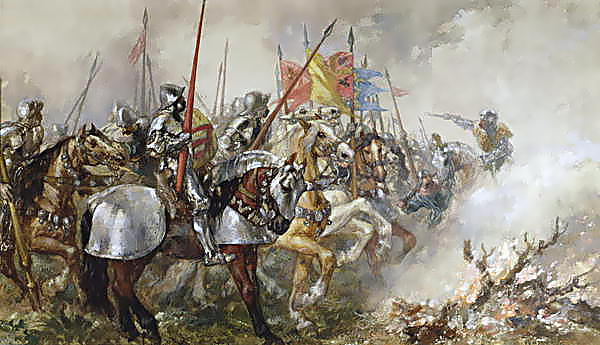
King Henry V at the Battle of Agincourt, by John Gilbert, credit Wikipedia
Endnotes, July 2022
In this edition: a glimpse into the lost musical world of English composer Walter Leigh, by Stuart Millson
From the astringent elegance of Peter Warlock’s songs and orchestral dances, based upon tunes from antiquity, to the early-morning garden scene in Elgar’s Starlight Express – “We shall meet the morning spiders, the fair-cotton riders”, the fleeting sunshine and shadow of lyrical English miniaturist music is one of the enchanting characteristics of our musical tradition.
Lovers of romantic music may also think of the wistful tale of an imaginary kingdom in Roger Quilter’s Where the Rainbow Ends, yet the musical establishment seems to have forgotten the name of a young Englishman who composed some of the 20th-century’s most graceful, finely-crafted and intriguing music of this genre: Walter Leigh.
Leigh’s output was comparatively modest: there were no symphonies or cantatas, and he at no time sought to emulate Vaughan Williams or Walton – although he composed, in 1935, a twelve-minute-long overture of dazzling dramatic effect, on the saga of Henry V. Yet there were small masterpieces: a Concertino for Harpsichord and String Orchestra (written in 1934, when he was just 29 years old, and recorded on the Lyrita label by the baroque specialist, Trevor Pinnock), Music for Strings (1931-2) and – my personal favourite, especially in the grand overture and exciting “Entry of the Mechanicals” – incidental music from 1936 to A Midsummer Night’s Dream, written for an open-air concert in Weimar; and an interpretation of Shakespeare very much in the spirit of Mendelssohn’s music.
Leigh graduated as an organ scholar from Cambridge in 1926, having been taught by the organist-composer, Harold Darke; and soon after left his native land for Berlin, studying (as did his contemporary, Arnold Cooke) with Hindemith – that remarkable giant of inter-war German modernism, noted for his Kammermusik (eight bare-boned, astringent chamber-sized mini-concertos), and his Mathis der Maler, a symphony and opera and the surging Symphony in E Flat of 1940, the conclusion of the first movement resembling a similar part of Walton’s First Symphony.
At first, the music of Hindemith’s young English pupil seems far removed from what we associate with Weimar Germany, but in the Overture and Dance to The Frogs, a 1936 composition about Dionysus embarking on a visit to the underworld and in the Concertino, some of the characteristics of Hindemith can be discerned – namely, the occasionally abrupt phrase or “stammer” at the ending of a line, and that pared-down economy of style which bespeaks Hindemith’s sound-world and of continental music of that time.
Shades of modernism and ethno-musicology appeared in a percussive score to a film entitled Song of Ceylon, a documentary commissioned by the Empire Marketing Board, which explained to its mid-1930s’ audience the mysteries of tea production and the customs of the land which kept England’s teapots filled. However, the film – commissioned by John Grierson (a pioneer of the documentary movement) and directed by Basil Wright, garnered great critical acclaim, winning not just first prize in the Documentary Class but The Prix du Gouvernement for the “Best Film in All Classes” at the 1935 Brussels International Film Festival. Belonging to that well-intentioned, patrician era, when colonial sentiment was still strong, the magnificently-filmed Song of Ceylon with its mountains, idols and native peoples can be viewed at the following website: www.colonialfilm.org.uk
The beauty of Walter Leigh’s careful, tuneful, baroque-fresh works is another of the unsung, undiscovered treasures of English music. And we can only speculate about Leigh’s career and where his creative talents might have led him, had his life not ended during active service in the Second World War. Killed in action in the North African campaign of 1942, the fate of this modern craftsman and neo-romantic has echoes of the tragic life of composer George Butterworth, who fell on the Western Front in 1916. What gems and masterpieces might these men have created, had these 20th-century world wars not happened.
Recording details:
Walter Leigh, Overture, Agincourt, BBC National Orchestra of Wales/Rumon Gamba, Chandos, 10898.
Leigh, Harpsichord Concertino etc, LPO/Braithwaite/Pinnock. Lyrita, LY0289
Stuart Millson is the Classical Music Editor of The Quarterly Review











Stuart Millson notes cultural depletion among the dysgenic impacts of the two Anglo-German wars. It is high time that such matters were given proper consideration by historians, anthropologists and policy-makers.